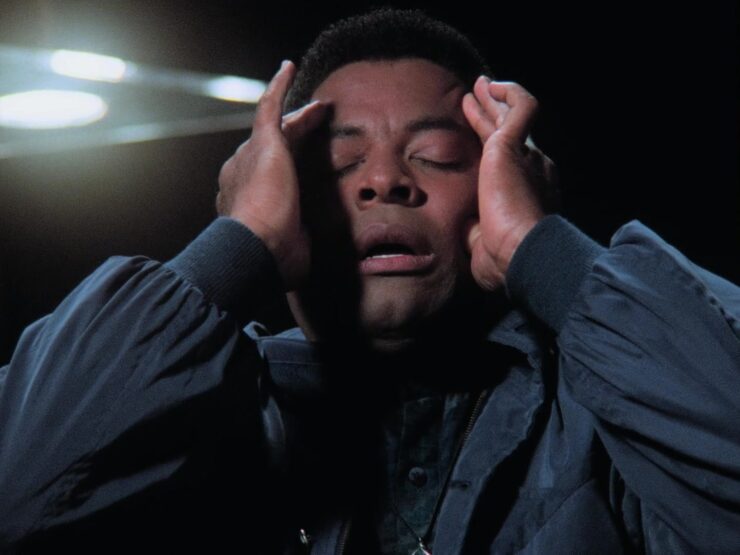“Mind War”
Written by J. Michael Straczynski
Directed by Bruce Seth Green
Season 1, Episode 6
Production episode 110
Original air date: March 2, 1994
It was the dawn of the third age… A Starfury wing tries to stop an unidentified ship. The ship doesn’t return the hail, but then energy waves come out from the ship and destroy all the Starfuries. That same ship then winds up at B5. Its occupant, Jason Ironheart, rents a room on the station and when he’s alone, suffers a bad headache that also shakes his cabin up.
Sakai exits the shower in Sinclair’s quarters and informs him that she has a meeting with Universal Terraform. She goes to the meeting—which Winters is hired to telepathically audit—and agrees to go to Sigma 957, which has indications of Quantium 40, which is used in jump gate construction (and of which there’s also a shortage). But they’re not sure, and they need a detailed survey, which is where Sakai comes in.
However, there’s a wrinkle: Sigma 957 is in territory that is disputed, and they need the permission of the Narn Regime to do it. G’Kar and Sakai discuss the matter, with G’Kar urging Sakai not to go. She, however, goes anyway, and G’Kar contacts the Narn homeworld to request a couple of ships pop over to Sigma 957.
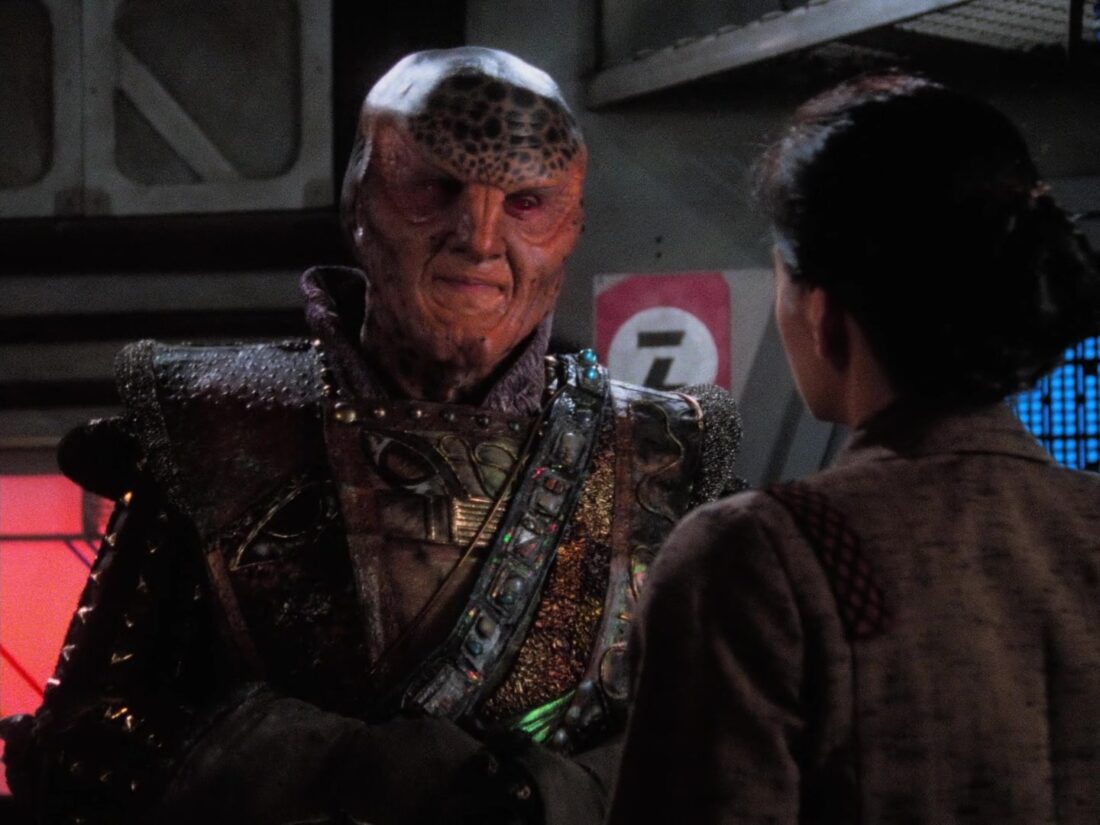
Two Psi Cops arrive, Bester and Kelsey. They are searching for Ironheart, who was one of Winters’ instructors at the Psi Corps Academy. Winters has not seen him, but Bester and Kelsey insist on a mind probe—which is invasive and painful—to verify. Sinclair and Ivanova observe the probe—though the cops give them the option to depart, which they decline—and are completely disgusted. They’re equally disgusted with Bester’s dismissal of why they’re seeking out Ironheart: it’s need-to-know, and Sinclair doesn’t need to know.
After Winters is excused, Ironheart approaches her. He knew the cops were on him, and he waited until after they probed her to make contact.
Ironheart volunteered for an experiment to increase psi-rating. There are a very rare few who are powerful enough to not only be telepathic, but also telekinetic, but most of those are also batshit insane. They succeeded in increasing Ironheart’s psi-rating to the point where he’s a telekinetic and also a much more powerful telepath. So much so that he knows that the intent is to use him as a weapon. He expresses concern to Winters that Psi Corps is becoming far more influential with EarthGov.
His conversation with Winters is cut short when he gets another headache, and this time the entire station feels the vibrations of what Kelsey refers to as a “mind quake.” Garibaldi traces the source of the quake to Blue 16—which is now surrounded by some kind of energy field they can’t get through.
Sinclair angrily tells Bester that he really needs to fucking know now, and Bester relents, telling Sinclair the same thing Ironheart told Winters. Bester fears that Ironheart is no longer truly human. Bester also mentions something Ironheart left out of his explanation to Winters: he’s a killer—not just of the Starfury crews we saw at the top of the episode, but also of the head researcher of the procedure. The cops also can telepathically insert a safeword into Ironheart’s mind, which will shut him down.
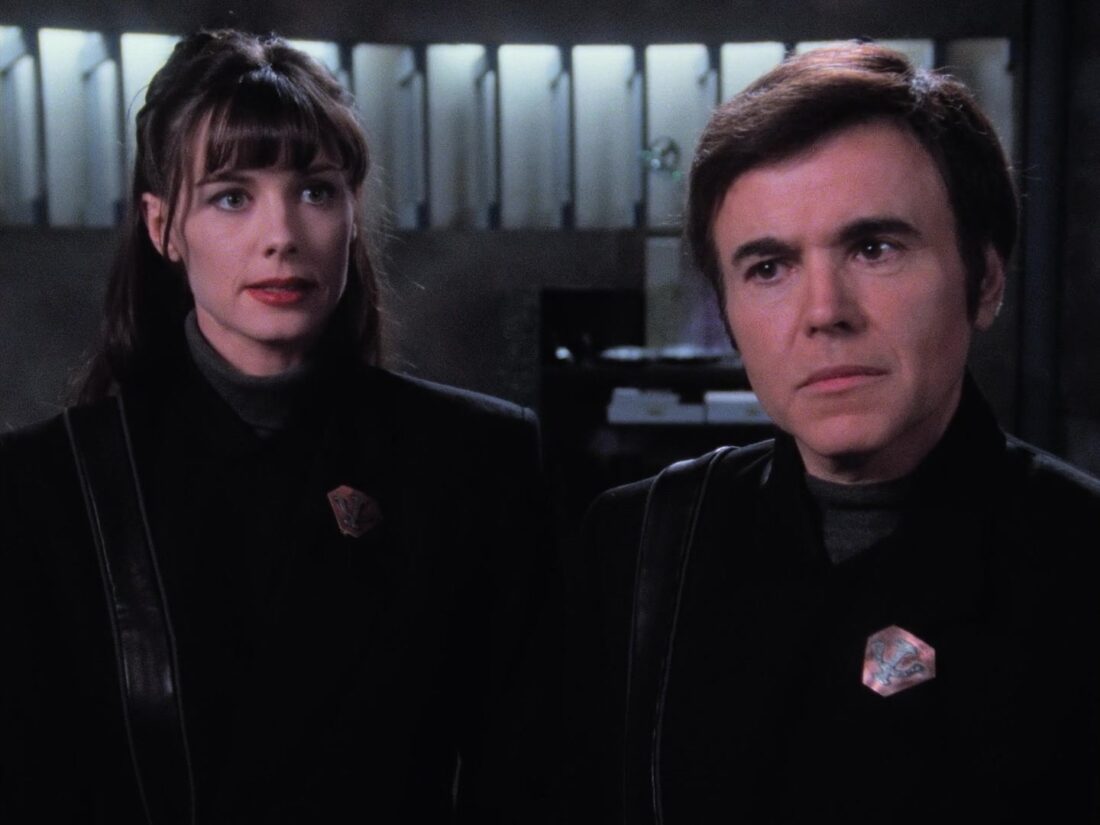
Winters—who was able to get out of Blue 16 before Ironheart sealed it off—approaches Sinclair and drops the other shoe: Ironheart wasn’t just her instructor, they were also lovers.
Sakai arrives at Sigma 957. While she’s scanning from orbit, a ship appears briefly with her in orbit. Its very presence disrupts every system on her ship, and she loses power and her orbit is decaying. However, the ships G’Kar sent show up and rescue her before she crashes.
Ironheart meets with Sinclair, who reluctantly agrees to let him go before he completely transforms into another state of being. (His reluctance is borne of Ironheart’s murder of the chief researcher, which Ironheart insists was only because he wanted to make sure nobody else was experiment upon. I guess this guy didn’t take notes? And anyhow, what about those poor Starfury pilots?)
Bester and Kelsey intercept them, and try to telepathically insert the safeword, but it doesn’t shut him down. It does weaken him enough that Kelsey pulls a weapon on him. In response, Ironheart vaporizes her. Then Bester fires on him, and Ironheart retaliates, but since he’s played by a more famous actor, he’s only knocked out.
Ironheart escapes to his ship, which then explodes in a plume of light. Ironheart telepathically tells the B5 crew that he’s going off to become one with the universe or whatever, tells Sinclair that he’ll see him in a million years, and tells Winters he’s giving her a gift.
Later in her quarters, Winters is able to move a penny with her mind.
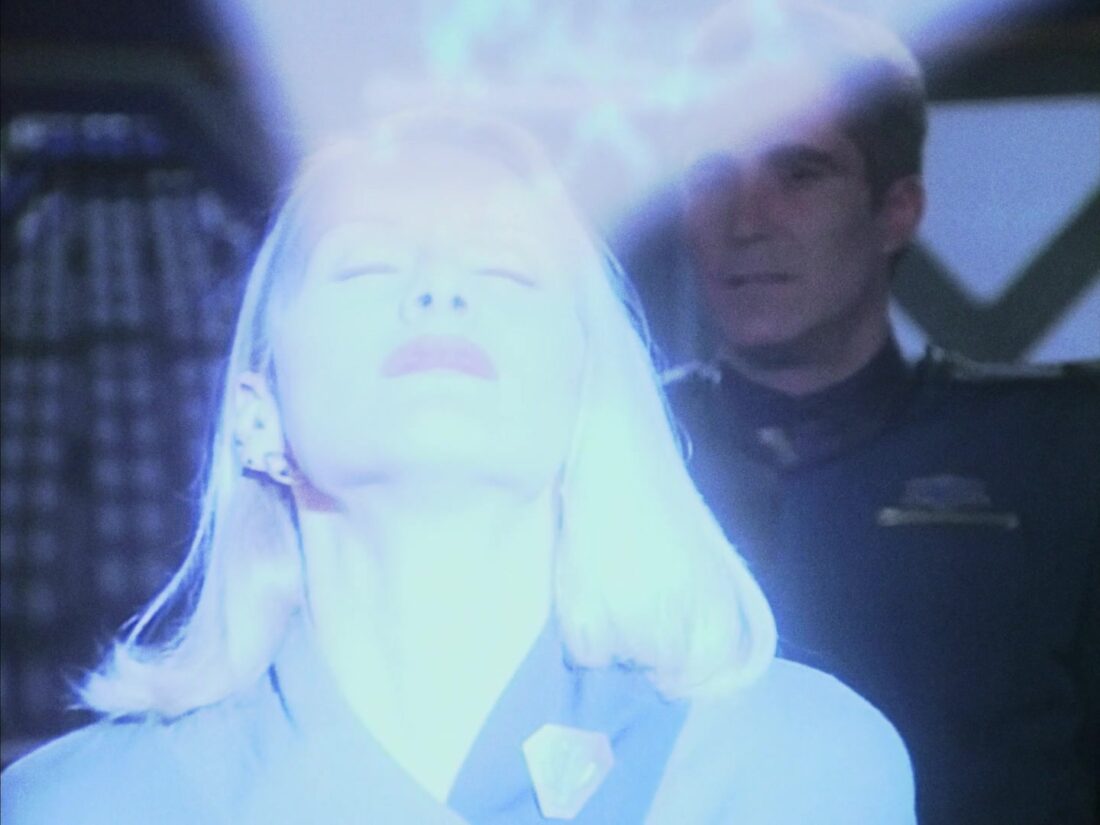
Bester agrees to a cover story that keeps the truth of what happened to Ironheart out of the record—it’ll just be that his ship blew up—and Sinclair won’t report Bester’s incompetence in letting the station be endangered and Kelsey killed. It’ll all be on Ironheart. Bester agrees, and apes the salute from the Village in The Prisoner and says, “Be seeing you” like they did in that show for no compellingly good reason.
Sakai confronts G’Kar, who explains (a) that no one on B5 is what they appear to be, including G’Kar himself, and (b) there are beings in the universe who are to hominid sentient life like humans and Narn as hominid sentient life is to an ant. They can no more know what those beings at Sigma 957 are than the ant they see on a flower knows what Sakai and G’Kar are.
Nothing’s the same anymore. The cops communicate silently with telepathy right up until they arrive in Sinclair’s office, at which point the commander very angrily tells them to use their voices, please, and to stay the hell out of his head.
Ivanova is God. Ivanova’s disdain for the Psi Corps is, if anything, reinforced by the behavior of the Psi Cops. She’s sufficiently revolted by the probe of Winters that she offers the telepath a glass of water afterward, despite her disdain for telepaths in general and Winters in particular.
The household god of frustration. In the department of, “I’ll take Things That Have Aged Embarrassingly Poorly for $100, Alex,” Garibaldi is on an elevator with Winters and the Universal Terraform dude, and he thinks spectacularly inappropriate thoughts about (based on where he’s staring) Winters’ ass. Winters elbows him in the nether regions, prompting Garibaldi to declare that he’s in love.
Though it take a thousand years, we will be free. G’Kar tries to warn Sakai, and does send help for her, which can be viewed as him being compassionate, or him making sure that the commander of the station’s girlfriend doesn’t get hurt, which would make G’Kar’s life more difficult.
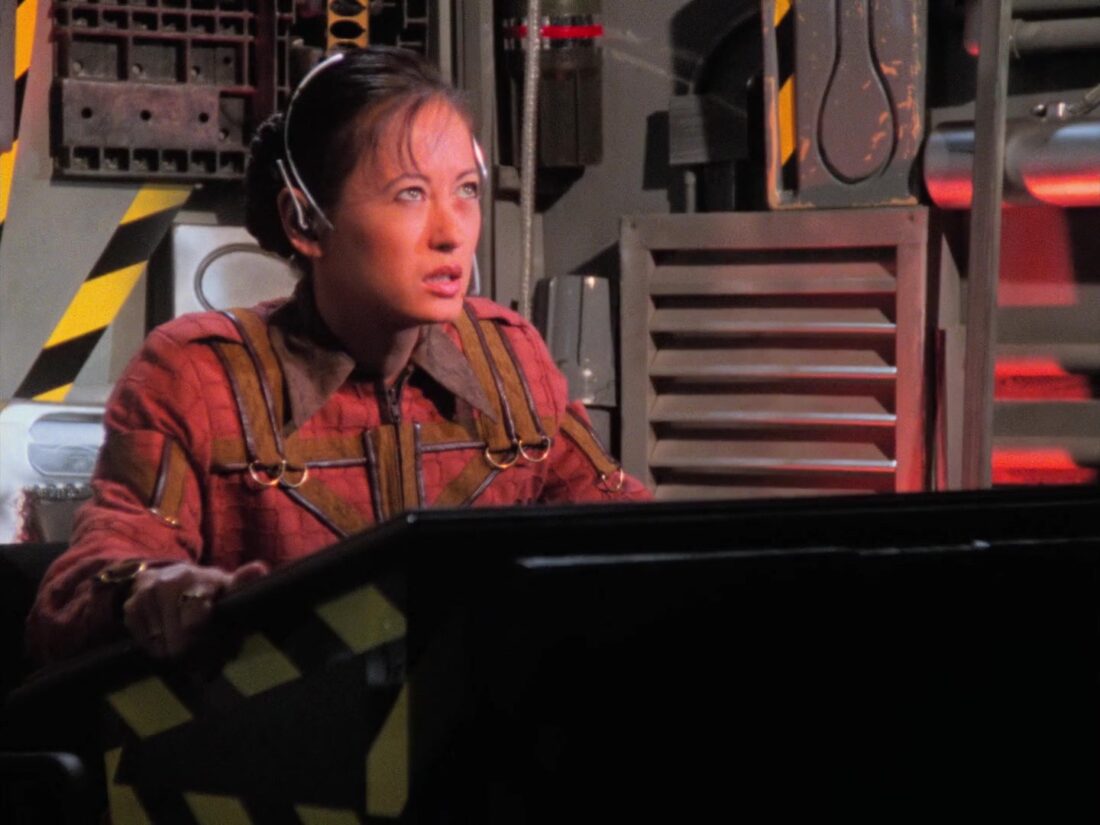
The Corps is mother, the Corps is father. We meet our first Psi Cops, and also get a notion of the telepathic ranking system. Most commercial telepaths (like Winters) are P5s. All Psi Corps instructors are P10s, and all Psi Cops are P12s. Psi Cops have much more latitude than other telepaths, and are in charge of maintaining the rules within the Corps.
Looking ahead. The beings Sakai encounters will later be revealed to be one of the older species in the galaxy known as the First Ones, who will play a large role in the overarching plotline. (The Vorlons, we will eventually learn, are also among the First Ones.) The Sigma 957 aliens will next be seen in “Voices of Authority” in season three.
G’Kar’s comment that not everyone it what they seem is meant to be prophetic, and he singles out Mollari, Delenn, Sinclair, and himself. Mollari’s persona as a clown will eventually be revealed to hide a certain viciousness, as well as a certain nobility, both of which are well buried at this point. Delenn’s being a secret member of the Grey Council has already been exposed to the viewer three times, in “The Gathering,” “Soul Hunter,” and “The Parliament of Dreams.” Sinclair’s missing twenty-four hours will expose what he hides even from himself, and this very episode begins the process of showing that there’s more to G’Kar than the mustache-twirling villain he’s been portrayed as to date.
No sex, please, we’re EarthForce. Winters explains to Sinclair how much more immersive sex between telepaths is, way way way beyond the physical.
The echoes of all of our conversations.
“I am both terrified and reassured to know there are still wonders in the universe—that we have not yet explained everything.”
—G’Kar waxing philosophical to Sakai.
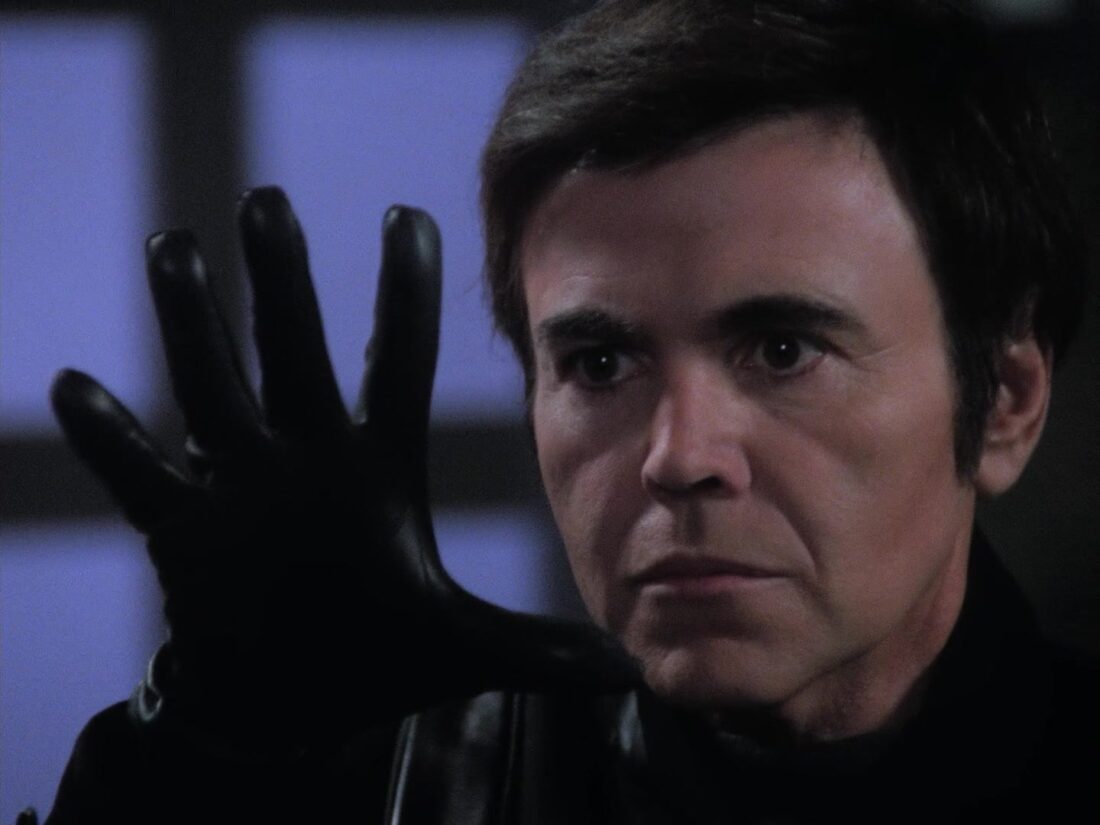
Welcome aboard. Julia Nickson officially makes Sakai recurring with her return appearance from last week’s “The Parliament of Dreams”; she’ll be back for her third and final appearance at the end of the season in “Chrysalis.”
William Allen Young, Felicity Waterman, Don Dowe, and Michael McKenzie all compete for who can be more wooden and boring as, respectively, Ironheart, Kelsey, the Starfury leader, and the Narn captain. (Dowe wins by a nose.)
But the big guest is the debut of Walter Koenig as Bester. Obviously best known for his role as Chekov on the original Star Trek, the role of Bester will continue to recur throughout all five seasons of the show.
Trivial matters. Bester is named for Alfred Bester—and will later be revealed to have that same first name as well—the author of The Demolished Man. The first book to win the Best Novel Hugo Award when the awards were created in 1953, it’s one of the definitive science fiction novels dealing with telepathy. While J. Michael Straczynski has said that it was just a tribute to Bester—who, among other things, was friends with B5’s creative consultant Harlan Ellison—and there was no other connection, the Psi Cops as established here and seen throughout the show are pretty much exactly like the telepathic police force in The Demolished Man.
At one point, Ivanova asks of the cops, “who watches the watchmen?” which is one translation of the phrase from Juvenal’s Satires, “Quis custodiet ipsos custodes?” It’s more commonly translated as “who guards the guardians?” but the one Ivanova used is the one Alan Moore used for the seminal comic book miniseries Watchmen. Straczynski would later write two of the Before Watchmen prequel miniseries in 2012 for DC.
Winters will later be revealed to be a sleeper agent, with another personality buried inside her mind, which will be brought to the fore in “Divided Loyalties.” How Ironheart, with his suuuuuuper telepathy, managed to miss this is left as an exercise for the viewer.
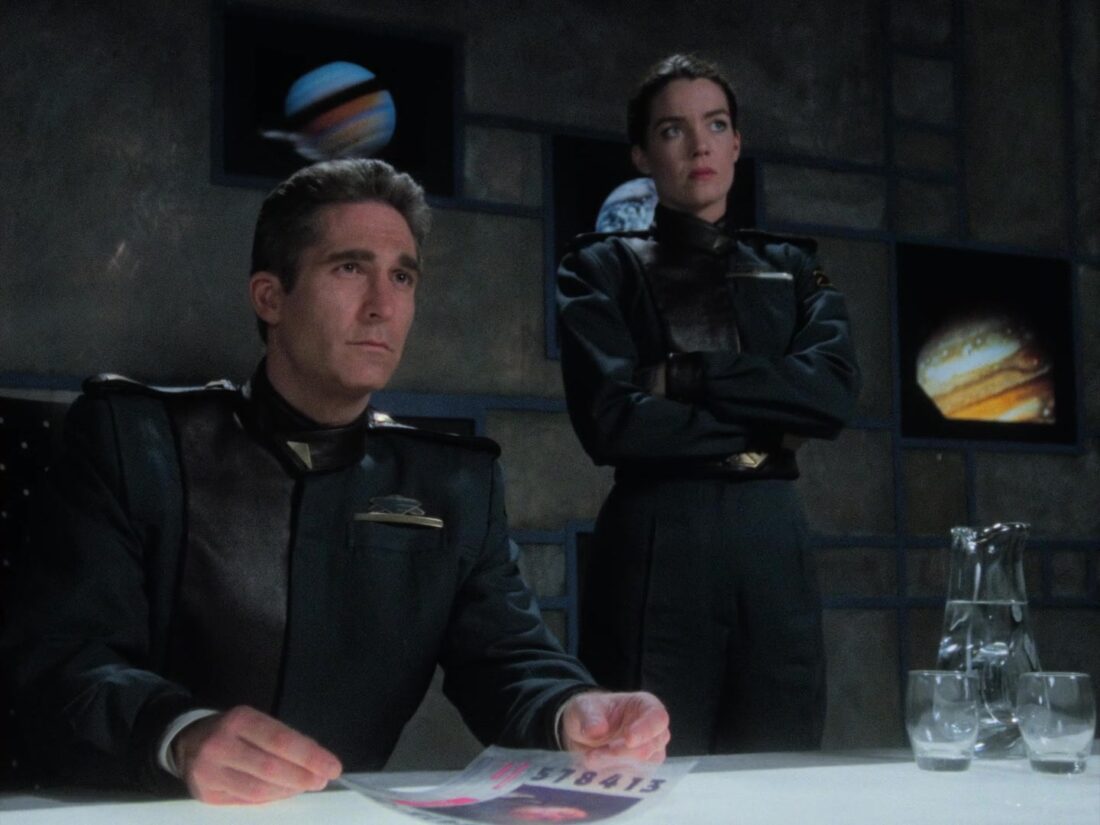
The name of the place is Babylon 5. “I give you a gift.” This introduces two very important parts of the B5 storyline, to wit, the Psi Cops and the First Ones (who don’t have that name yet).
In particular, we’re introduced to Bester, who will go on to appear in a dozen more episodes (and was scheduled to appear in a Crusade episode, but the series was cancelled before it was filmed), and become a very important recurring character. He creates quite a strong impression here, though a big part of it is seeing a very familiar actor in a most unfamiliar role, as Bester is absolutely nothing like Chekov. Which is fabulous, as he’s a very effective villain.
Certainly more so than his sidekick, as Felicity Waterman is dreadful as Kelsey. In that, she’s matched by the episode’s primary focus, which is Jason Ironheart—a dopey name for an awful character. William Allen Young plays him with all the charisma of a dead fish, utterly failing to convey the anguish and torment the script calls for, which takes the episode out at the knees, sadly. Not that the script helps overmuch, trying to make Ironheart out to be a tragic figure and a victim, hoping we won’t notice that (a) he slept with one of his students, and (b) he committed several murders, only one of which he was able to even remotely justify. Indeed, the glossing over of the death of the Starfury group at the top of the episode is galling. And having Bester imitate the denizens of the Village in The Prisoner was a little too cutesy. (I remember one friend saying after this episode aired in 1994 that it’s never a good idea to reference a show that’s better than yours.)
The B-plot does, at least, have better acting in it, as G’Kar finally gets a bit more depth, and we’re introduced to the rather important notion that there are much older, much more powerful species floating around the galaxy that are a fair piece farther along on the evolutionary road than we are.
Next week: “The War Prayer.”










